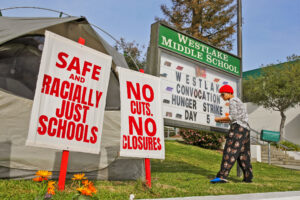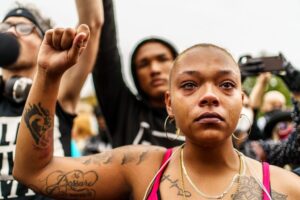I was preparing for a work call when I heard the telltale helicopter sounds overhead. I say “telltale” because my neighbourhood gets several different types of helicopter traffic, each with its own sonic profile and emotional resonance — TV news choppers drawing wide circles in the sky, gathering footage of a backup or accident on a local freeway, which gives you a simple, selfish feeling: Glad I’m not on the freeway!; a Life Flight helicopter screaming over the rooftops toward Oakland Children’s Hospital, which can make you sad if you stop to imagine what that’s about; and the ominous, hovering-in-place sound of a police helicopter at mid-altitude, which generally means a criminal suspect is in the area, desperately trying to evade capture, which, if your teenage daughter has just left the house, can give you a little hit of worry.
This time, the motoring sound overhead said “police helicopter” and thus “desperate criminal”, and my teenage daughter had just left the house. I was getting ready to worry, but then a parent-friend texted me a local news article that might have eased my mind. There wasn’t a desperado on the loose where my daughter was out walking, according to the headline. There was merely “Major Police Activity” at our local elementary school. A dire feeling spread through my chest. For Americans, such a headline means one thing — Mass shooter. It’s happening, I thought. It’s really happening here. But then I read the article, and suddenly I wanted to do some desperate crime on whoever wrote that damn headline. There was no mass shooter at our little school. There was just a bomb threat.
The threat was false, of course. No one located a bomb hidden around the school, not even the police 1,000 feet up in a helicopter. (Generalising from the many bomb-threat stories I’m familiar with, a pretty good way to be confident you’re not going to be bombed is if you’ve just had a bomb threat.) But the bomb threat wasn’t the only trouble to visit the school that day. The school office and several school parents also received a barrage of angry and sometimes racist and threatening emails written in response to… well, in response to a playdate.
This is what happened: someone claiming to be the parent of one or more kids at the school — which my three kids attended from 2011 to 2022 — made a Reddit post. The post lamented that, once again, the “Equity and Inclusion Committee” of the school’s parent organisation was hosting a weekend “Playdate Social for Black, Brown, and API Families” on the school’s playground. (API means “Asian and Pacific Islander”.) This parent attached the flyer for the playdate alongside his Reddit post (which has been deleted), and this flyer, along with a screenshot of his post, was picked up by the popular Twitter account Libs of TikTok.
Libs of TikTok generally tweets about things that are alien and alarming to people who have not signed on to the recent revolution in culture and morals — sexually explicit books written for young children, a transgender activist encouraging children to run away from home, a school system hiring a drag queen and accused paedophile to be its new middle-school principal. The account has 3.4 million followers, and since any collection of 3.4 million people is going to contain some number of unbalanced and violent psyches, and since Libs of TikTok followers have self-selected based on an appetite for things that make them angry and disgusted, you’d expect the typical post from this account to generate a wave of unwelcome correspondence to its starring character.
But Libs of TikTok added something extra to its tweet about our local playdate. The outrage effect of its tweets typically owes to the primary source documents they contain — videos, photographs, book pages. That’s why it’s called “Libs of Tiktok” — its moral revolutionaries beclowning themselves, no commentary needed. But in this case, it gave its own gloss on the playdate, without which there would have been far less outrage, a much smaller number of angry emails that would have been far less openly racist, and probably no bomb threat at all. “A California elementary school,” the tweet says, “reportedly held a race segregated ‘playdate social’ for all students except the white kids.”
But the flyer doesn’t say “all students except the white kids”. It says, “for Black, Brown, and API families”. I’m not trying to be clever or sophistical here. It’s true that, if you add up all the official racial and ethnic categories of family comprised by the phrase “Black, Brown, and API”, no other category is left out besides “white” (no other category that I can think of; the taxonomy here comes from diversity bureaucrats, not logicians or set theorists). But there’s a distinction in the difference that would have been meaningful to the readers of the flyer whose kids go to the school.
To put it a different way: for (white) parents in the school community it would have meant something much more pointed and hostile if the flyer had actually said “for all students except the white kids”, or “no whites families allowed”, or something similar. Since the flier didn’t say those things, since no one was seeming to aim an intentional poke in their eyes, they could go on with their day after seeing the flyer, entirely unoffended and unriled, even if in their private thoughts they lamented some aspect of this flyer, this implied logic of excluding white families, the larger mindset it expresses, the politics that issue from this mindset. They could do this not because they’re squishy Californians or moral relativists or political cowards, but because this is their community, and it was a playdate. It was families at a schoolyard on a Saturday, families they know, parents they like, kids who are in class with their kids, friends with their kids. There was literally no way to openly make those critical points that didn’t threaten to blow up — so to speak — all those relationships, to blow apart the school’s community, and there is nothing in the supposed provocation that made it minimally worthwhile to try. That’s why the guy who started all this registered his objections on a Subreddit, under a pseudonym, instead of angrily waving a sign in front of the school.
The playdate, you might say, was the harmless practice of a bad theory. Indeed, this was more or less the Redditor’s point, a man who said he himself fits in the “brown” category (his Reddit handle suggesting that, ethnically, he’s a mix of Iranian and Pakistani). He didn’t mean his post to go viral and feed a national frenzy of racist threats against his kids’ school. He wasn’t really complaining that white families were being injured by this playdate. He was speaking more abstractly. This weekend gathering was an instantiation of a bad model, which blandly self-perpetuates thanks to strong incentives, and to its unchallenged, foundational status in key institutions. It is often tolerated in practice partly because, in individual instances such as our local playdate, you have to put your First Principle glasses on and sort of squint to see what the problem is: “I suppose the effect of such an invitation is to exclude white families from the casual Saturday playdate on the Upper Yard, sort of, I guess. I hadn’t really thought of it like that before.”
In fact, these kinds of racially circumscribed gatherings are happening all the time, with no opposition or controversy, at schools all over the country. I bet they’re happening in Tennessee, in Alabama, in Louisiana, without anyone getting up in arms about them. They’re that innocuous, in themselves. The people who organise and attend them are regular parents, nice people who care about their kids and in no way deserve to be harried and threatened by faceless fanatics from other states. In organising these events as they do, explicitly including some people and leaving others unmentioned in hopes that they won’t show up and make things awkward, they’re simply practising Equity and Inclusion, contradictory as that sounds. Equity and Inclusion is simply the language of the institutions that reach out to them in their demographic specificity and say: “You are special in your worries and struggles, because of your skin colour.” As parents of school-age children, they surely do have worries and struggles, some of which may relate in some plausible way to their skin colour, and so who can blame them for accepting the terms in which their institutional patrons approach them with offers of special consideration? For my part, even though I dislike the Equity and Inclusion model, I’m way angrier about cowardly outsiders coming for my fellow Oakland school parents and my kids’ former school than I am about that weekend playdate.
Still, it is a bad model — which I’ll now give its more common name: Diversity, Equity, and Inclusion, or DEI. DEI is a robust form of public, society-ordering power that is exercised privately, by unelected bodies inventing and enforcing codes of affinity and behaviour rooted not in legislation but in the institutional interests and operational biases of those bodies. It works to analyse and categorise racial and ethnic difference, but also to administer it — that is to treat people differently according to which DEI category they inhabit. Because this goes against deep-seated human conceptions of fairness, DEI methods generate a steady flow of conflict and resistance, which is something else DEI personnel have deputised themselves to administer, often coercively.
And in this bureaucratic way of seeing and ordering the human subjects within its purview, the DEI model undermines the type of solidarity I felt when my fellow Oakland school parents came under attack from outsiders. This model simply can’t make sense of fully inclusive multiracial affiliations — such as “Oakland school parents” or “Americans” — except as human agglomerations to be taken apart, sectioned and set against each other according to the terms of its programming. In other words, the main paradigm by which virtually all mainstream institutions in the US understand and manage race relations actively promotes social fracture, when the country is already coming apart for other reasons.
This I know leaves me in a sort of paradox, a guy fondly invoking solidarity with a community informed by an ideology that is antagonistic to that solidarity. But I feel no need to resolve the paradox, to line up my sentiments with my pet ideas. Indeed, one of the ways in which I see myself practising solidarity with my fellow Oakland school parents is by peacefully coexisting with the paradox, choosing the people, in moments of conflict or crisis, over the ideas. Another way is by declining to take offence at a little flyer about a casual weekend playdate — unlike the email hysterics and bomb-threateners so eagerly triggered the moment a Twitter account gave them the signal — when no offence was intended.
Disclaimer
Some of the posts we share are controversial and we do not necessarily agree with them in the whole extend. Sometimes we agree with the content or part of it but we do not agree with the narration or language. Nevertheless we find them somehow interesting, valuable and/or informative or we share them, because we strongly believe in freedom of speech, free press and journalism. We strongly encourage you to have a critical approach to all the content, do your own research and analysis to build your own opinion.
We would be glad to have your feedback.
Source: UnHerd Read the original article here: https://unherd.com/




